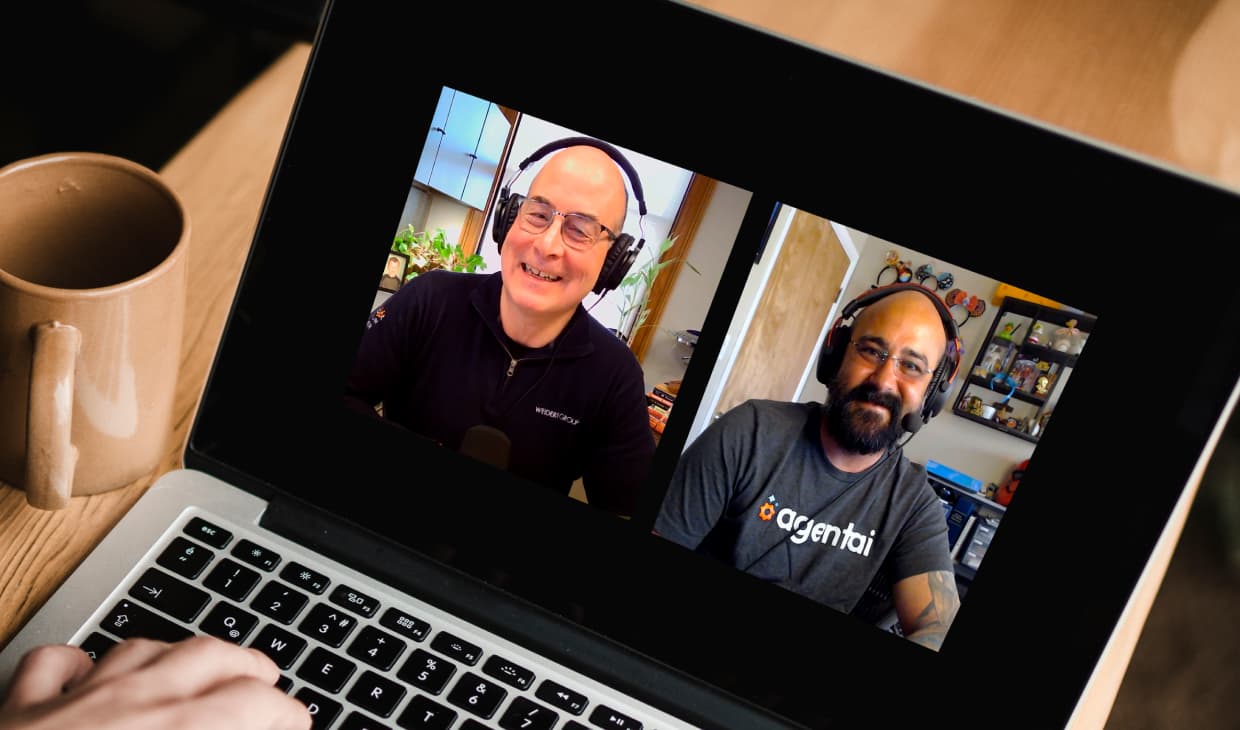The New Search Frontier: How AI is Changing What You Need to Know About SEO
Written by
How do I keep my website and content marketing relevant in the age of AI? And what about SEO — does it matter anymore? Which matters more, optimizing for AI or SERPs?
These questions keep marketers up at night, and for good reason. As platforms like ChatGPT and Perplexity reshape the ways we find information online, the rules of digital visibility are being rewritten.
Weidert Group recently invited HubSpot Evangelist Kyle Jepson as a guest on The ChangeOver Podcast to discuss brand advocacy in a B2B context, and Kyle brought this bonus conversation to the table:
In exploring differences between AI and SEO outcomes for brand visibility, he found some surprising results — many websites that dominate in SERPs are practically invisible to AI.
Equally intriguing: Some lesser-known sites are becoming AI superstars.
Plus, a point that deserves more discussion: while optimizing for AI search is in itself a new marketing tactic, the differences between AI and SEO optimization indicate a fundamental shift in how we need to think about digital content. If you’re still focusing solely on traditional SEO, you might be setting yourself up for a fall as search queries move from Google and its ilk to the likes of ChatGPT, Claude, Perplexity, and other AI search tools. Check out the podcast for the backstory on Kyle’s experiment:
Check out episode 15 of The ChangeOver now, then subscribe on Apple, YouTube, Spotify, Weidert.com, or your favorite podcast app.
So, Kyle Set Up a Quick Experiment…
As HubSpot’s first-ever Evangelist, Kyle has built a community on social media by sharing quick videos with tips, insights, and tools that help marketers get the most out of their efforts — and their HubSpot investment. He engages daily with his communities to explore trends and challenges in marketing, to crowdsource burning questions, and get users’ opinions on new HubSpot features after they ship.
So Kyle reached out to his social networks and asked them to use these two HubSpot tools and share their scores with him:
- Website Grader to assess their sites’ traditional SEO performance
- AI Search Grader to evaluate their visibility on platforms like ChatGPT
HubSpot’s Website Grader has been around for years, helping marketers identify areas to improve their website’s SEO performance. It’s a quick, go-to resource for checking to see how fast, responsive, and technically sound a website is.
HubSpot’s newer AI Search Grader focuses on a different angle: how content performs in AI-powered search tools. It measures how often a business is mentioned, sentiment behind the mentions, and how aligned a brand’s content is with users’ AI queries.
Here’s the twist: there was often an inverse relationship between the SEO score and the AI performance score.
As Kyle explained it,
“Websites that nailed the technical side of SEO didn’t always do well with AI visibility. That’s because AI platforms like ChatGPT don’t crawl websites like search engines do. Rather, they ‘read’ web pages in a way that’s more like humans do; they prioritize clear, high-quality content that answers precise questions (think: prompts). Sentiment — that’s emotion — factors in. On the other hand, traditional SEO is impacted not solely by content, but also a great deal by technical optimization strategies.”
So, a website that scores high marks based on functionality, structure, and performance — things like page load speed, mobile responsiveness, structure, schema markup, meta tags, etc. — might not perform as well in terms of AI visibility if its content doesn’t address AI search priorities.
And the same can be true in reverse: a site that does a great job answering specific questions, providing contextually rich answers, and structuring content for readability can perform well in AI search. But without solid SEO, it’ll struggle to show up in SERPs.
Which Matters More, SEO Performance or AI Visibility?
Before you assume you have to pick one (and hope it’s the right one), remember there are things you can do to perform well in both. Prioritize based on your target audiences, business goals, and your awareness of which platforms they prefer for finding information.
Understand your audience’s behavior and preferences
Use surveys, website analytics, and CRM data to understand how customers find your business. Ask these questions:
- Do your customers primarily use traditional search engines like Google, or are they engaging with AI tools like ChatGPT or Perplexity?
- Are they looking for broad information (better suited for SEO) or specific answers to detailed questions (ideal for AI visibility)?
For example, If you’re targeting tech-savvy professionals who rely on AI tools for research, prioritize AI visibility. For audiences that heavily rely on Google searches, a focus on SEO may have greater impact.
Assess Your Current Performance
Run an audit using HubSpot’s Website Grader or a similar SEO score checker, to evaluate your SEO performance. Use AI Search Grader to measure how often your brand appears in AI-powered search results and the sentiment of those mentions. If your SEO scores are high but AI visibility is low, consider focusing on creating high-quality, E-E-A-T-ified, precise question-driven content to address the needs of AI users in your audience. On the other hand, if you outperform in AI and lag in SEO, start by scrutinizing your site’s technical performance — simple things like content structure and schema markup can help take that valuable content and make it more visible to search engines.
What Marketers Can Do to Improve SEO & AI Search Performance
Should You Prioritize SEO or AI Visibility?
Achieving strong performance in both traditional SEO and AI-driven search isn’t about choosing one over the other. Optimizing for both today sets you up for success in the future as AI platforms keep rising in popularity — and as the technology evolves.
Make sure your website performs in the technical basics, and tailor content to deliver context, specificity, and timeliness — characteristics prioritized by AI search tools.
Use strategic keywords, optimize meta tags, and leverage structured data (schema markup) to enhance search engines’ understanding of your content, as you answer questions users might ask AI platforms. Go deeper than basic, surface-level Q&As. Include clear examples and practical applications. Update regularly. Revisit the grader tools to track performance changes.
1. E-E-A-T First
AI platforms love trustworthy content. That means demonstrating Experience, Expertise, Authority, and Trustworthiness (E-E-A-T) in everything you publish. For example, if you’re an industrial manufacturer, showcase your team’s decades of experience, certifications, and high-profile customer stories.
2. Make Your Site Easy to Navigate
Whether it’s a traditional search engine or an AI crawler, your site needs to be user-friendly and crawlable. Simplify the navigation, fix broken links, and ensure every page is accessible.
3. Write for Humans, Not Robots
AI tools like ChatGPT mimic how people think and talk. Certain types of content should do the same. Instead of stuffing web pages with keywords, focus on answering real questions. For instance, if customers often ask how to reduce maintenance costs on industrial equipment, create a guide that addresses their questions in plain language.
4. Align Content With AI Prompts
Brainstorm the ways people might phrase questions to AI. As a thought exercise, think about the way you might ask a voice assistant, versus how you type a search query into Google. Are they the same?
5. Go Beyond Your Website
AI visibility isn’t solely about your site. It’s also about your presence across the web. Contribute to forums, guest blog on reputable sites, and maintain active social media accounts to build awareness and authority.
How HubSpot Tools Can Help With Both
Along with the graders for quick assessments, HubSpot’s tools make optimizing for SEO and AI visibility easier, too:
- Content Assistant and Content Remix: Quickly create blog posts, social updates, and emails, and repurpose content from one format to another
- SEO tools: Fix technical SEO issues like missing meta descriptions and optimize for keywords that matter
- Topic clusters and pillar pages: Build authority by linking related content together within your site, creating a critical mass of information that suggests relevance
- CRM-powered insights: HubSpot CRM data can be a goldmine for content ideas. Just check out the questions your sales or support teams answer every day — boom, you have content ideas for AI-friendly blog posts
The Road Ahead: Balancing SEO & AI
The way people search for information is changing fast. AI platforms are becoming an integral part of how buyers make decisions, and as marketers, our job is to adapt. By leveraging the right tools and strategies, it’s possible to achieve the SERP performance and AI visibility you need to keep growing your business.
Want to dive deeper into the future of AI and SEO? Check out The ChangeOver Podcast for insightful discussions on topics that matter most to B2B marketers and industrial business leaders. Listen today and unlock fresh, proven strategies to optimize your marketing in an AI-powered world.
Subscribe To Our Blog
Information. Insights. Ideas. Get notified every time a new Weidert Group blog article is published – subscribe now!
You May Also Like...

Artificial Intelligence
Revenue-Driving B2B Content Marketing Strategy with Andy Crestodina

Artificial Intelligence
AI Agents Are Here—How Smart Businesses Are Using Them Now

Inbound Marketing
Podcasting Playbook: What We Learned After 100 Days of Running a B2B Podcast
Accelerate Your Growth with
Weidert Group
If you’re ready to explore a partnership, request a personalized consultation with our team.

